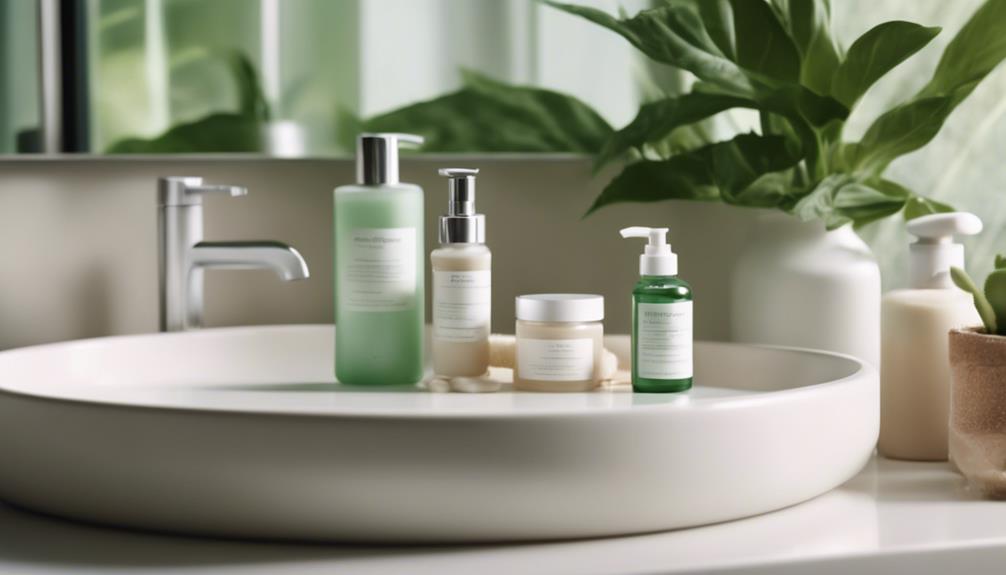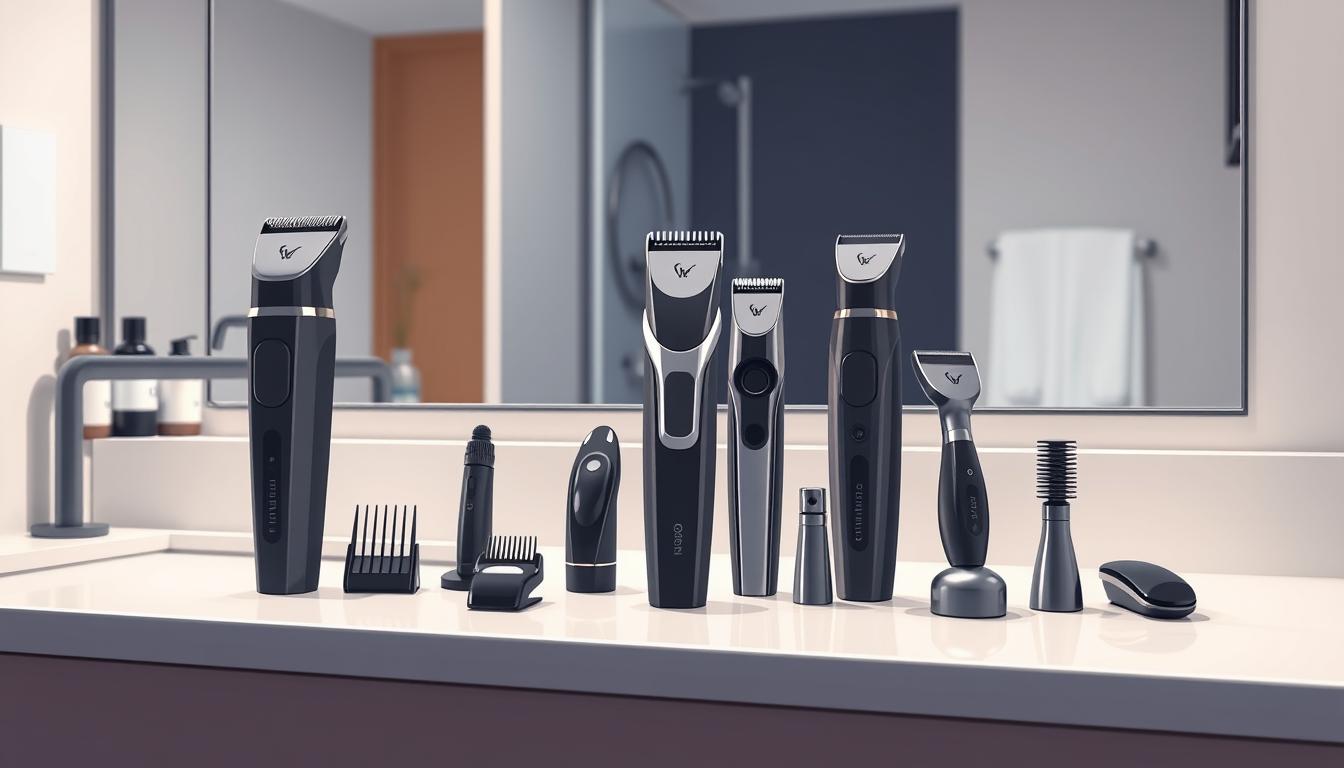If you have acne-prone skin, you should begin your skincare routine with a gentle cleanser that contains salicylic acid or benzoyl peroxide, and cleanse your skin twice a day. Follow up with a lightweight, non-comedogenic moisturizer to keep your skin hydrated without clogging pores. In the evening, use targeted treatments like niacinamide or retinoids to help manage breakouts. Don’t forget to always use broad-spectrum SPF during the day to protect your skin. Remember to refrain from touching your face and avoid over-exfoliating. By maintaining a consistent skincare regimen, you can achieve clearer skin over time. If you want to learn more insights on how to optimize your skincare routine, click here.
Key Takeaways
- Cleanse twice daily with a gentle salicylic acid or benzoyl peroxide cleanser to remove excess oil and bacteria.
- Use a lightweight, non-comedogenic moisturizer to maintain hydration without clogging pores.
- Incorporate targeted treatments like niacinamide or benzoyl peroxide for active blemishes and oil regulation.
- Apply a broad-spectrum sunscreen with at least SPF 30 daily to protect against UV damage and inflammation.
Understanding Acne and Its Causes
Understanding acne and its causes is crucial for effectively managing this common skin condition that affects millions around the globe.
Acne primarily arises from inflammation, clogged hair follicles, and the presence of acne-causing bacteria, particularly Propionibacterium acnes. One of the significant contributors to acne is hormonal changes, especially increases in androgens, which lead to the overproduction of excess oil or sebum. This excess oil can clog pores, creating an environment for bacteria to thrive and cause blemishes.
You might notice that acne often flares up during puberty, but it doesn't stop there; adult acne is on the rise, affecting many individuals well into their 30s and beyond. Factors like stress, humidity, and certain medications can exacerbate the condition.
While you may have heard myths linking chocolate or greasy foods to acne, it's crucial to focus on the actual triggers, which involve a combination of hormonal fluctuations and lifestyle choices.
Essential Skincare Routine Steps
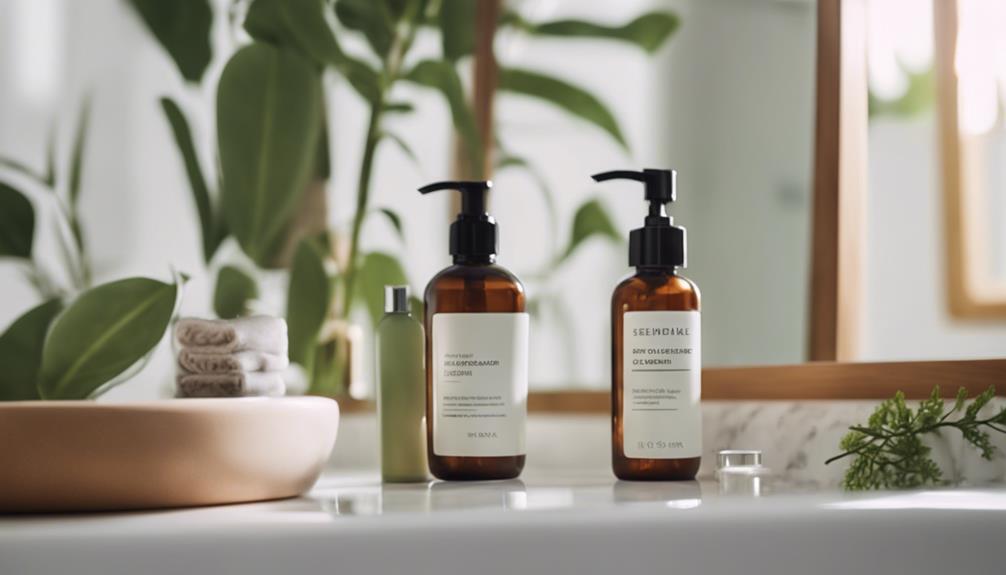
An effective skincare routine for acne-prone skin consists of five essential steps that can help manage breakouts and promote healthier skin.
Start by cleansing your face twice daily with a gentle salicylic acid or benzoyl peroxide cleanser. This helps remove impurities without stripping moisture, which is fundamental for maintaining your skin's balance.
After cleansing, incorporate a hydrating serum with hyaluronic acid. This step is critical as it helps retain moisture, especially when acne treatments can lead to dryness.
Following the serum, apply a lightweight, non-comedogenic moisturizer. This will keep your skin hydrated without clogging pores. If your skin feels particularly dry at night, consider using a thicker moisturizer for added moisture.
Additionally, don't forget to include targeted treatments like niacinamide or beta hydroxy acid to regulate oil production and reduce inflammation.
Finally, always finish your skincare routine with a broad-spectrum SPF during the day to protect your skin from UV damage, especially when using active ingredients that increase sun sensitivity.
Morning Routine for Acne-Prone Skin
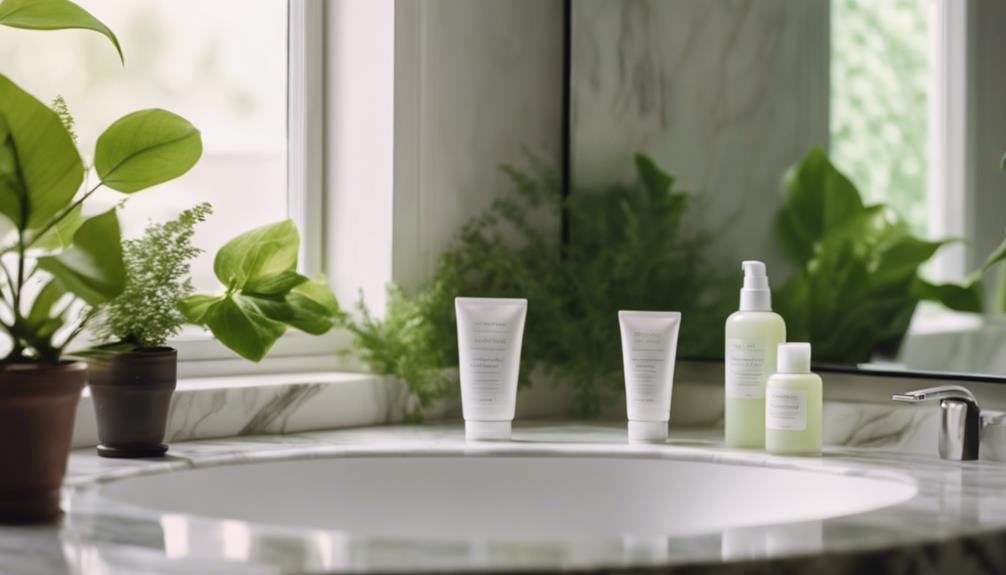
To kick off your morning routine for acne-prone skin, start with a salicylic acid or benzoyl peroxide cleanser to remove excess oil and impurities without causing irritation. This first step is essential to prevent breakouts throughout the day.
| Step | Product Type | Purpose |
|---|---|---|
| Cleanser | Salicylic Acid/Benzoyl Peroxide | Removes oil & impurities |
| Moisturizer | Lightweight, Oil-Free | Hydrates without clogging pores |
| Sunscreen | Non-Comedogenic SPF 30+ | Protects from UV damage |
After cleansing, apply a lightweight, oil-free moisturizer to keep your skin hydrated and to maintain its barrier, which helps prevent overproduction of sebum. Next, consider incorporating a Vitamin C serum to brighten your complexion and shield against environmental stressors. Don't forget to finish with a non-comedogenic sunscreen with at least SPF 30 to protect your acne-prone skin from UV damage that can worsen inflammation and scarring. If you have any active blemishes, use a targeted treatment with benzoyl peroxide or salicylic acid to reduce inflammation and speed up healing throughout the day.
Evening Routine for Acne-Prone Skin
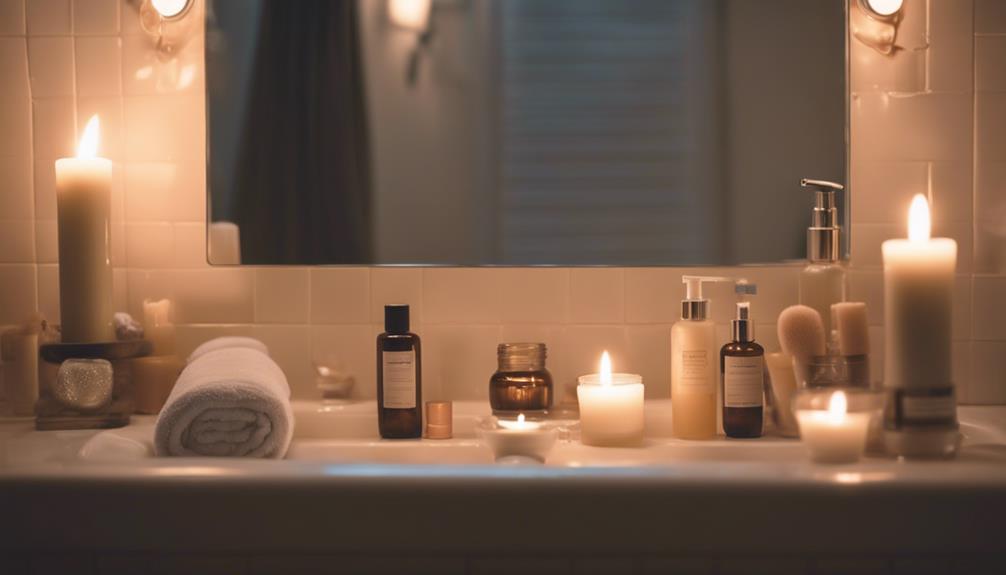
After a long day, it's important to properly cleanse and care for your skin to prevent acne while you sleep.
Start your evening routine with double cleansing. Use an oil-based cleanser to remove makeup and impurities, followed by a gentle foaming cleanser that contains salicylic acid. This helps prevent breakouts and keeps your skin barrier healthy.
Next, incorporate a chemical exfoliant, like glycolic or salicylic acid, 2-3 times a week. This will promote cell turnover and unclog pores, making it easier for your acne treatments to work effectively.
After cleansing, apply a retinoid such as Tretinoin or Adapalene. These products enhance skin cell turnover, reducing the appearance of acne lesions and scars.
Don't forget to hydrate your skin with a lightweight, non-comedogenic moisturizer. This prevents dryness from the acne treatments while keeping your skin barrier intact.
Finally, target active breakouts with a spot treatment containing benzoyl peroxide or salicylic acid. This will reduce inflammation and accelerate healing overnight, ensuring you wake up with clearer skin.
Stick to this routine for the best results!
Key Ingredients for Acne Treatment
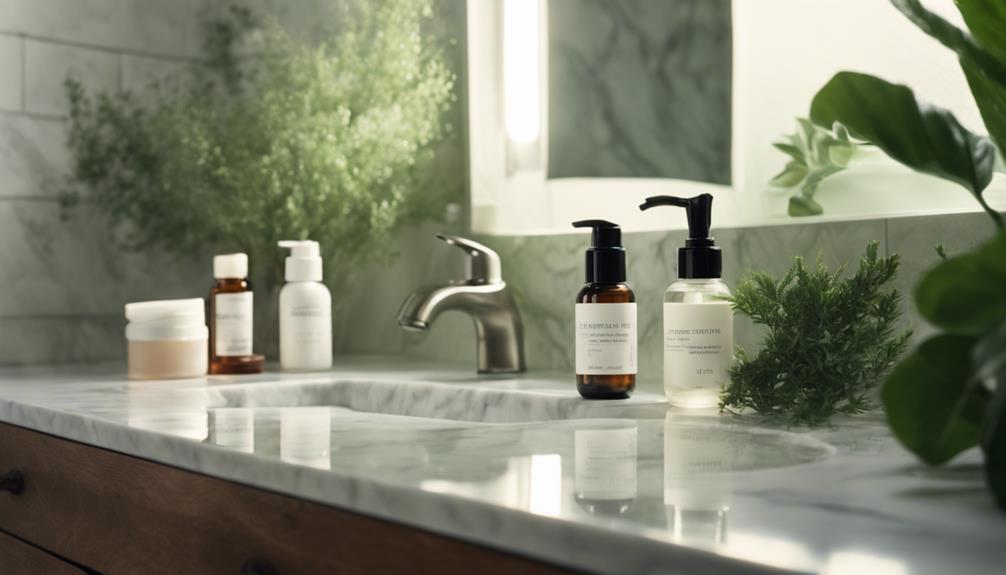
Understanding the key ingredients in acne treatment can considerably enhance your skincare routine and improve your skin's condition.
One powerful ingredient is salicylic acid, a beta hydroxy acid (BHA) that penetrates pores to exfoliate and reduce inflammation, making it effective for treating blackheads and whiteheads. You might also want to take into account benzoyl peroxide, an antimicrobial agent that kills acne-causing bacteria while reducing oil production, helping to prevent future breakouts.
Retinoids, such as tretinoin, are another essential component in your acne-fighting arsenal. These vitamin A derivatives promote cell turnover and unclog pores, which can also minimize the appearance of acne scars over time.
Additionally, incorporating niacinamide into your routine can provide multiple benefits. This multifunctional ingredient reduces inflammation, regulates sebum production, and enhances your skin barrier, alleviating redness and irritation associated with acne.
For ideal results, think about pairing these ingredients strategically in your routine. Always patch-test new products and consult a dermatologist if you're unsure about combining specific treatments.
With the right ingredients, you can create an effective regimen tailored to your acne-prone skin.
Recommended Products for Skincare
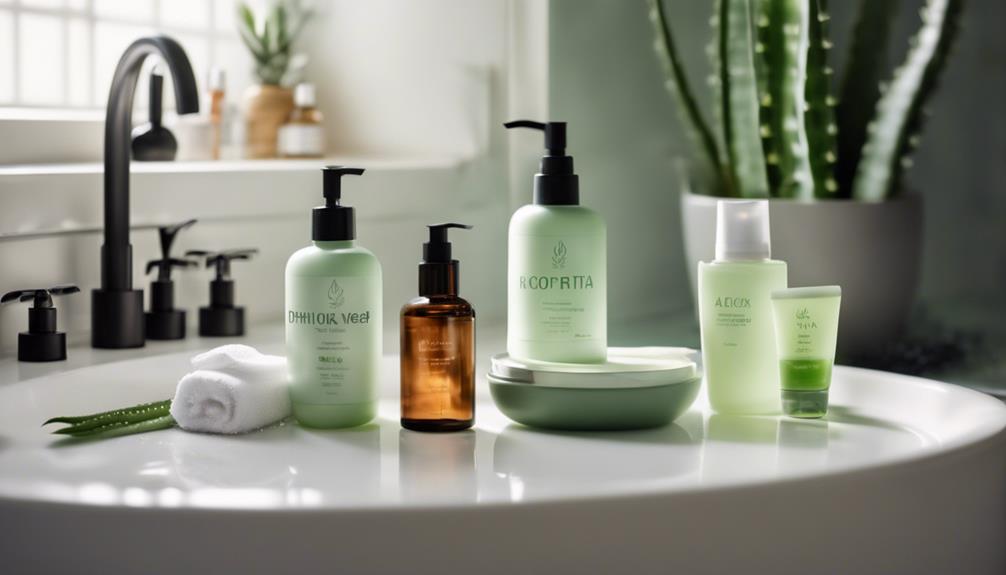
When managing acne-prone skin, choosing the right products can make a significant difference in achieving clearer, healthier skin. Here's a quick guide on recommended products to include in your skincare routine:
| Product Type | Recommended Product | Key Benefits |
|---|---|---|
| Cleansers | Acnecide 5% Wash Benzoyl Peroxide | Targets acne-causing bacteria without overdrying |
| Toners | Paula's Choice Skin Perfecting 2% BHA Liquid Exfoliant | Unclogs pores and reduces inflammation |
| Acne Treatment | Neutrogena Rapid Clear Stubborn Acne Spot Treatment Gel | Quickly reduces inflammation and promotes healing |
| Moisturizers | CeraVe PM Facial Moisturizing Lotion | Lightweight, non-comedogenic, and soothing |
| Sunscreen | Beauty of Joseon Relief Sun Rice + Probiotics | Broad-spectrum SPF 30 protects from sun damage |
Incorporating these products into your daily routine will help manage acne effectively. Always remember to patch-test new products and consult a dermatologist if you're unsure about what works best for your skin type. Consistency is key to seeing results!
Professional Treatments for Acne
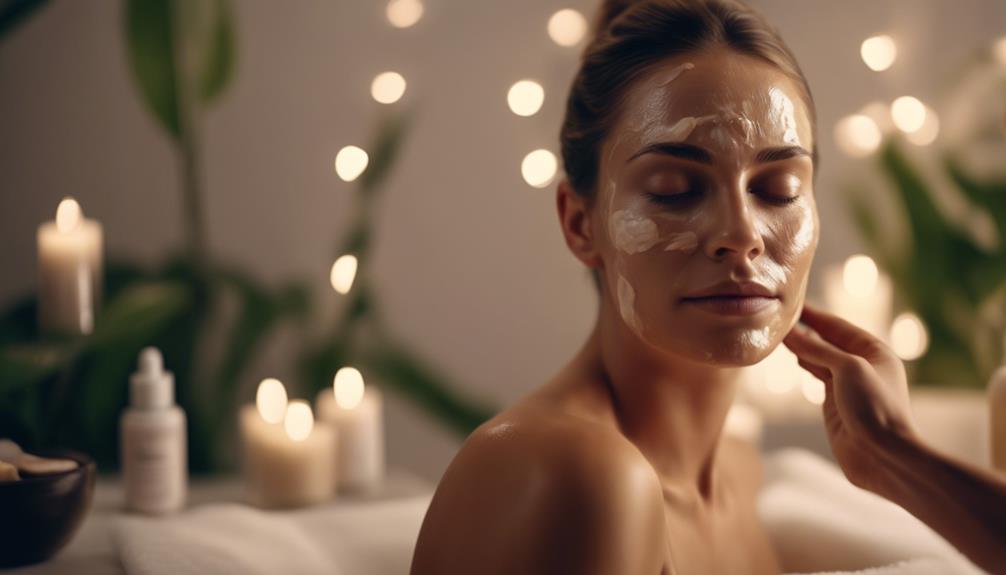
When it comes to tackling acne, professional treatments can offer you powerful solutions.
You might consider prescription options like Tretinoin for cell turnover or in-office procedures like chemical peels for clearer skin.
Exploring these treatments with your dermatologist can help you find the best approach tailored to your needs.
Prescription Treatments Overview
Prescription treatments for acne can greatly improve your skin by combining topical and oral medications tailored to your specific needs.
Topical retinoids, like Tretinoin, are often prescribed to promote cell turnover and prevent clogged pores, considerably enhancing your skin texture when used regularly. If you're dealing with moderate to severe acne, your dermatologist may recommend oral antibiotics to reduce inflammation and bacterial growth, yielding effective results alongside topical treatments.
For women experiencing hormonal acne, hormonal therapies such as birth control pills or anti-androgens can help regulate hormone levels, addressing the underlying causes of breakouts. It's vital to consult with a dermatologist who can evaluate your unique situation and create a personalized treatment plan.
Regular follow-ups with your dermatologist are important for monitoring the effectiveness of your prescription treatments. They'll help you make necessary adjustments to guarantee the best results in managing your acne-prone skin.
With the right guidance and commitment, you can achieve clearer, healthier skin and boost your confidence. Don't hesitate to seek professional help to address your specific concerns and explore the best options for your skincare journey.
In-Office Procedure Options
In-office procedures offer effective solutions for managing acne, providing targeted treatments that can enhance your skin's appearance and health. One popular option is chemical peels, which exfoliate the skin and unclog pores, resulting in clearer and smoother texture.
For ongoing care, dermatologists can prescribe topical treatments like Tretinoin, promoting cell turnover to prevent new acne lesions from forming.
Light therapies, such as blue light therapy, are another powerful choice. These treatments target and kill acne-causing bacteria, reducing inflammation and helping to prevent future breakouts. If you're dealing with cystic acne, corticosteroid injections can offer rapid relief by directly reducing inflammation and swelling at the injection site.
Regular follow-ups with your dermatologist are essential. They can tailor in-office procedures based on your skin's response and the severity of your acne, ensuring you get the most effective treatment possible.
Combining these professional treatments with your daily routine can lead to significant improvements in your skin's health, so don't hesitate to explore your options!
Common Habits to Avoid
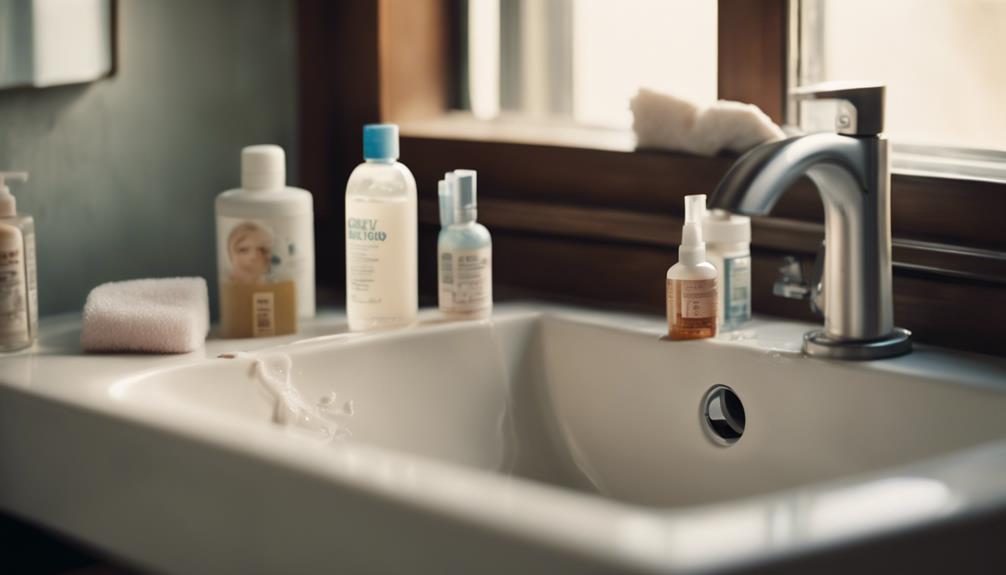
When managing acne-prone skin, it's essential to avoid certain habits that can worsen your condition.
Touching your face and over-exfoliating can both lead to increased breakouts, while skipping sunscreen leaves your skin vulnerable to damage.
Touching Your Face
Touching your face can greatly worsen acne by transferring bacteria and oils from your hands, leading to more breakouts. If you have acne-prone skin, this habit can be especially detrimental.
Studies show that people who frequently touch their faces are more likely to experience flare-ups due to the introduction of contaminants. Every time you rest your chin in your hand or rub your forehead, you risk aggravating existing acne.
The act of touching your face not only introduces bacteria but can also cause inflammation, potentially leading to scarring if you pop or irritate pimples. To minimize breakouts, it's crucial to be aware of your face-touching habits and actively work to keep your hands away from your face throughout the day.
Try implementing strategies to break this habit, such as keeping your hands busy or using a fidget toy. Regularly washing your hands and creating a clean environment can also help reduce the urge to touch your face and limit the transfer of acne-causing agents.
Over-Exfoliating Skin
Over-exfoliating can wreak havoc on your skin, leading to increased breakouts and irritation instead of the smooth, clear complexion you desire.
It's crucial to recognize the signs of over-exfoliation, such as redness, sensitivity, and peeling. When you push your skin too hard, it may produce more oil, resulting in clogged pores and more acne.
To maintain a balanced acne skincare routine, avoid these common habits:
- Exfoliating Daily: Limit exfoliation to 2-3 times a week to allow your skin to recover.
- Using Multiple Exfoliants: Don't mix scrubs with chemical exfoliants like AHAs or BHAs, as this can cause irritation.
- Ignoring Skin Signals: Pay attention to signs like tightness or sensitivity; these indicate your skin needs a break.
- Skipping Moisturizer: Always follow up with a gentle moisturizer after exfoliating to help maintain hydration.
Skipping Sunscreen Daily
Neglecting sunscreen daily can considerably harm your skin, leading to increased inflammation and heightened risk of post-inflammatory hyperpigmentation. If you have acne-prone skin, skipping sunscreen might exacerbate your breakouts. UV exposure can trigger excess oil production, which often results in more frequent flare-ups. This can be particularly challenging if you're using acne treatments like retinoids, which increase your skin's sensitivity to sunlight.
Daily application of a broad-spectrum sunscreen with an SPF of 30 or higher is essential. Not only does sunscreen protect against harmful rays, but it also helps speed up the healing process of acne lesions. Without it, you may prolong scarring and delay recovery from active breakouts.
When selecting a sunscreen, look for a non-comedogenic formula. This guarantees it won't clog your pores while still providing the necessary UV protection.
Remember, applying sunscreen should be a non-negotiable part of your skincare routine. By prioritizing this step, you'll not only safeguard your skin against sun damage but also support your overall acne management efforts.
Don't underestimate the power of sunscreen—your skin will thank you for it!
Importance of Moisturizers
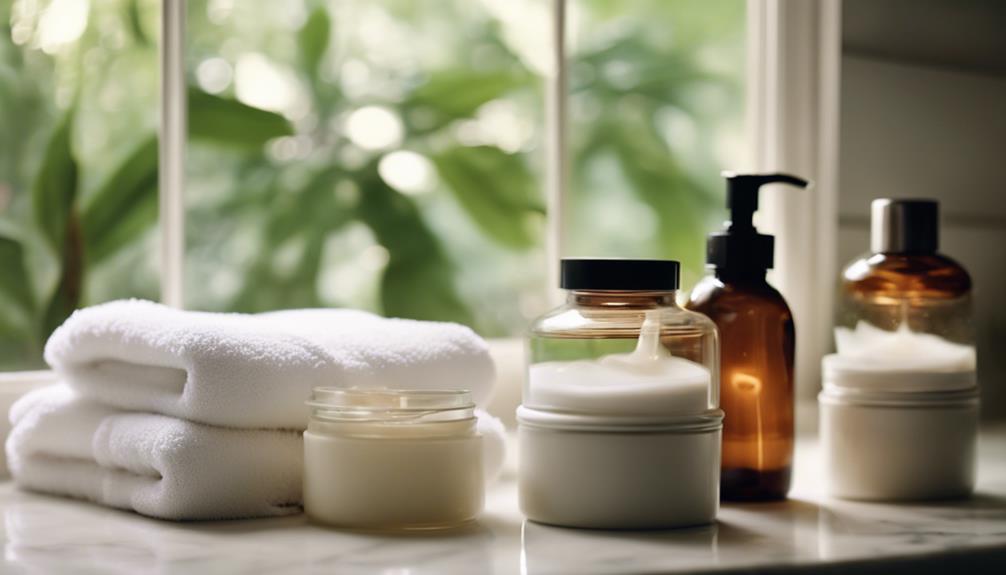
Moisturizers play an essential role in managing acne-prone skin by balancing hydration and preventing excess oil production that can lead to breakouts. Many people think that moisturizing can worsen acne, but the right products can actually help your skin thrive. Here's why you shouldn't skip this vital step:
- Balance Hydration: Keeping your skin hydrated prevents overproduction of sebum, which is a key culprit in breakouts.
- Non-Comedogenic Options: Look for moisturizers labeled as non-comedogenic; these won't clog your pores and are ideal for acne-prone skin.
- Soothe Inflammation: Regular use of moisturizers can help calm redness and irritation, making your skin feel more comfortable during acne treatments.
- Enhance Treatment Effectiveness: Hydrated skin improves the effectiveness of acne treatments by maintaining skin barrier function, reducing irritation, and promoting healing.
Incorporate moisturizers containing beneficial ingredients like niacinamide to help regulate oil production and reduce redness.
Tips for Managing Oily Skin
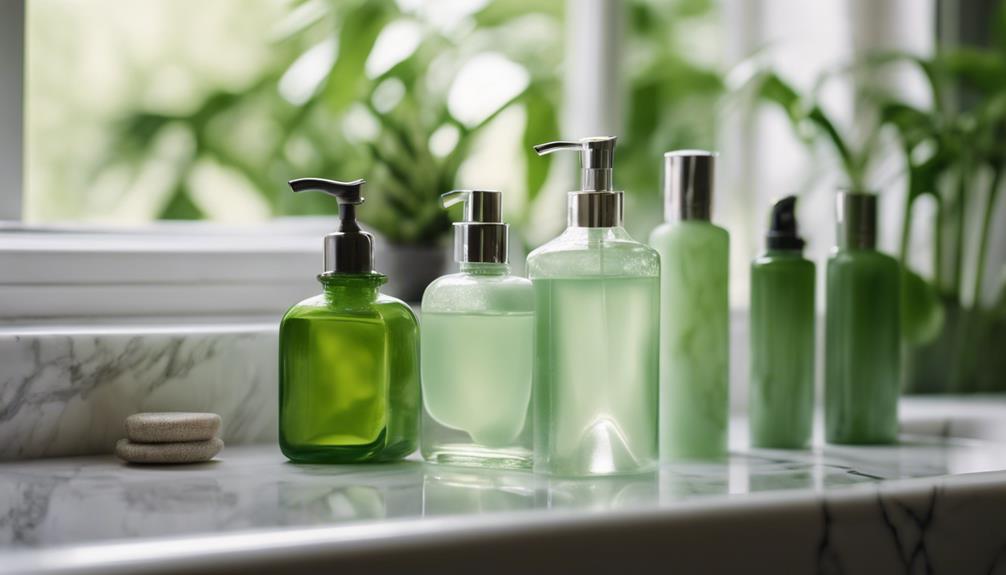
Managing oily skin doesn't have to be complicated.
Start with oil-free cleansers that effectively remove excess oil while keeping your skin balanced.
Pair that with effective hydration strategies to guarantee your skin stays healthy without becoming greasy.
Oil-Free Cleansing Methods
How can you effectively cleanse oily skin without worsening acne? The right oil-free cleansing methods are essential for managing acne-prone skin. Start by using a non-comedogenic cleanser that contains salicylic acid or benzoyl peroxide to remove excess oil while preventing clogged pores.
Here are some effective tips to contemplate:
- Double Cleansing: In the evening, begin with an oil-based cleanser to dissolve makeup, then follow up with a foaming cleanser to remove any residual impurities.
- Chemical Exfoliation: Incorporate regular exfoliation with BHAs to help unclog pores and reduce excess oil production, enhancing skin texture.
- Blotting Papers: Use blotting papers throughout the day to absorb excess oil without disturbing your makeup or skincare, keeping a matte finish.
- Lightweight Moisturizer: Always finish your cleansing routine with an oil-free moisturizer to maintain hydration, preventing your skin from overproducing oil due to dryness.
Effective Hydration Strategies
Finding the right hydration strategies can help you maintain balance in oily skin while keeping breakouts at bay. Start by choosing a lightweight, oil-free moisturizer that won't clog your pores. Look for products containing hyaluronic acid; it provides deep hydration without the greasy feel, making it perfect for your acne-prone skin.
Incorporating niacinamide can also be beneficial, as it regulates sebum production while delivering essential hydration. Additionally, don't overlook the power of a hydrating toner. Choosing one with glycerin can help control excess oil and maintain your skin's moisture balance.
Lastly, remember that internal hydration is just as important as topical products. Aim to drink at least 8 glasses of water daily to support overall skin health and help reduce oiliness.
| Strategy | Benefits |
|---|---|
| Lightweight Moisturizer | Balances moisture without clogging pores |
| Hyaluronic Acid | Deep hydration, non-greasy feel |
| Niacinamide | Regulates oil and hydrates |
| Hydrating Toner | Controls oil, maintains moisture |
| Adequate Water Intake | Supports skin health, reduces oiliness |
Implementing these strategies can greatly improve your skincare routine.
What are the most effective tips for a skincare routine for acne-prone skin?
For the best skincare routine for acne, start with a gentle cleanser to remove impurities. Use a non-comedogenic moisturizer to keep the skin hydrated without clogging pores. Incorporate a targeted acne treatment like salicylic acid or benzoyl peroxide. Finish with a broad-spectrum sunscreen to protect the skin.
Are the Skincare Tips for Acne-Prone Skin Also Effective for Acne?
Yes, the skincare tips for acne-prone skin can be effective for acne as well. Following an effective acne skincare routine, including gentle cleansing, non-comedogenic products, and regular exfoliation, can help manage and reduce acne breakouts. Consistency is key in maintaining clear and healthy skin.
Conclusion
In your quest for clear skin, remember that consistency is key, much like a well-rehearsed symphony.
By following the steps outlined in this guide, you're composing a routine that harmonizes with your skin's needs.
Embrace the journey, avoid common pitfalls, and let those effective ingredients work their magic.
With patience and care, you'll be well on your way to achieving that radiant complexion you've been dreaming of—your skin's own masterpiece awaits!
